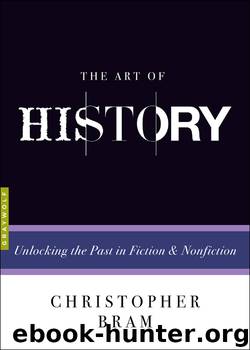The Art of History by Christopher Bram

Author:Christopher Bram
Language: eng
Format: epub
ISBN: 978-1-55597-939-3
Publisher: Graywolf Press
Published: 2016-04-04T04:00:00+00:00
The surprising notes are sometimes comic and sometimes profound, but all add to the shifting, vibrating reality of the novel.
Tolstoy’s pace and drama and command of details sweep us backward in time with amazing ease. I think he surprised himself with how much he knew and how real he could make this experience, more real than anything he’d written before. For the first half of the book, that was enough. Not until the second half, after Napoleon invades Russia, did Tolstoy stop being satisfied with just telling a story and want to dig around in the meaning and philosophy of history. I will wait until the final chapter of this book, about epilogues and endings, to discuss those ideas, but let me say here that I believe the real meat of War and Peace is in its storytelling, not in the sixty or so pages of woolly commentary—the fifty pages of the second epilogue and ten pages of passages scattered earlier—that many critics love to discuss.
But one piece of story that shifts War and Peace from the realm of the novel and closer to a work of history is the presence of Napoleon. In most historical fiction, capital-h History—that impersonal force of politics and power—is something that happens completely outside the control of the characters, like the weather. The presence of Napoleon changes that—or should. Napoleon is the demiurge of the novel, its haunting spirit. He is mentioned in the very first sentence. Pierre and Andrey begin by admiring him. (Gore Vidal’s Aaron Burr admired him, too.) He appears briefly in person three hundred pages in, when he stands over the wounded Andrey on the battlefield of Austerlitz. Nikolay glimpses him from a distance at his meeting with Tsar Alexander.
We don’t see him up close until the start of the second half of the novel, when Tolstoy shows Napoleon at his headquarters, receiving a Russian emissary. He is neither liberator nor Antichrist but a “tubby, dumpy,” cranky figure who is not embarrassed to lose his temper in public. In a single scene, Tolstoy knocks to pieces the Great Man theory of history. Nothing in the pages that follow changes that first impression. He remains a mindless nullity, a mysterious puppet. Napoleon only rides the horse of history, thinking he is in control even as the horse takes him wherever it pleases.
Napoleon becomes part of what might be called the zen of Tolstoy: Nothing is what it seems. Nothing goes according to plan, but ordinary people sometimes get what they want. Life is smarter than you are.
Download
This site does not store any files on its server. We only index and link to content provided by other sites. Please contact the content providers to delete copyright contents if any and email us, we'll remove relevant links or contents immediately.
4 3 2 1: A Novel by Paul Auster(12364)
The handmaid's tale by Margaret Atwood(7750)
Giovanni's Room by James Baldwin(7318)
Asking the Right Questions: A Guide to Critical Thinking by M. Neil Browne & Stuart M. Keeley(5752)
Big Magic: Creative Living Beyond Fear by Elizabeth Gilbert(5751)
Ego Is the Enemy by Ryan Holiday(5412)
The Body: A Guide for Occupants by Bill Bryson(5076)
On Writing A Memoir of the Craft by Stephen King(4925)
Ken Follett - World without end by Ken Follett(4719)
Adulting by Kelly Williams Brown(4564)
Bluets by Maggie Nelson(4542)
Eat That Frog! by Brian Tracy(4518)
Guilty Pleasures by Laurell K Hamilton(4437)
The Poetry of Pablo Neruda by Pablo Neruda(4090)
Alive: The Story of the Andes Survivors by Piers Paul Read(4017)
White Noise - A Novel by Don DeLillo(4000)
Fingerprints of the Gods by Graham Hancock(3985)
The Book of Joy by Dalai Lama(3970)
The Bookshop by Penelope Fitzgerald(3843)
